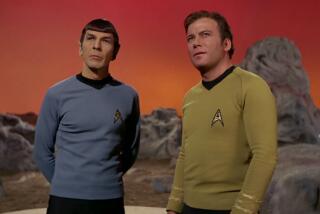‘Star Trek’ Series Creator Gene Roddenberry Dies
- Share via
Producer and writer Gene Roddenberry, whose “Star Trek” is one of the most popular television and movie series of all time, died Thursday in Santa Monica. He was 70.
“He died of cardiac arrest at 2:46 p.m. and he arrived at our hospital at 2:26 p.m. after he collapsed at his doctor’s office across the street,” said Grace Cheng, spokeswoman for Santa Monica Hospital-Medical Center.
“Few ideas in the annals of motion picture and television history have inspired more passion and allegiance on the part of an audience as has ‘Star Trek,’ said Paramount Pictures Chairman Brandon Tartikoff. “Twenty-five years ago Gene Roddenberry imagined an optimistic future for us all and his vision will live on well into that future.”
Roddenberry, a decorated World War II bomber pilot and former Los Angeles police sergeant who was born in El Paso, Tex., was writer and producer of the “Star Trek” series, which began on TV in 1966 and is syndicated around the world.
The unflappable Capt. Kirk (William Shatner), the pointy-eared Vulcan Dr. Spock (Leonard Nimoy) and the compassionate Dr. McCoy (DeForest Kelley) created a cult, whose “Trekkies” convene annually to celebrate their passion.
Roddenberry also created “Star Trek: The Next Generation,” which has a different cast and runs on syndicated TV. His wife, Majel Barrett, was Nurse Chapel on “Star Trek” and the screen mother of Deanna Troi in “Star Trek: The Next Generation.”
The movies and television shows were both infused with Roddenberry’s hope for the future and a sense of optimism that humans would eventually develop the ability to get along with one another and with extraterrestrials.
He was also generally viewed as being far ahead of his time by presenting both female and minority characters on the series.
The most successful of the five movies was 1986’s “Star Trek IV: the Voyage Home,” in which the crew of the star ship Enterprise went back in time to modern-day San Francisco in order to rescue whales. The movie grossed more than $110 million domestically.
Roddenberry’s death comes at a time when Paramount Studios has started gearing up the publicity for the last movie in the series, due to be released on Dec. 13 and called “Star Trek VI: The Undiscovered Country.”
Several of the stars, including Shatner, said the movie would be the last in the series using the original cast. The movie may also serve as a springboard for the cast members of “Star Trek: the Next Generation” because it will include Michael Dorn, who plays a Klingon officer named Worf in the TV show.
Roddenberry’s life was nearly as exciting as those of his characters. He flew 89 missions in B-17 bombers in the South Pacific, winning the Distinguished Flying Cross and the Air Medal. He began to write while in the South Pacific, selling stories to flying magazines and poetry to publications including the New York Times.
When he returned from combat he became a trouble-shooter for the Air Force, investigating the causes of air crashes. After the war he joined Pan American World Airways. His plane crashed at night in the Syrian desert on a flight from Calcutta and he directed a harrowing rescue that included fending off nomads who came to loot the dead.
Back in the states, Roddenberry continued flying until he saw television for the first time and realized its enormous potential. Leaving his flying career behind, he went to Hollywood, where he found the infant industry was not hiring a lot of writers.
A friend suggested he join the Los Angeles Police Department to see life from that valuable perspective. Rising to sergeant, he was selling scripts to such programs as “Goodyear Theatre,” “The Kaiser Aluminum Hour,” and “Dragnet.” With his writing credentials established, he turned in his badge and practiced his craft full time.
He was head writer for “Have Gun, Will Travel,” and his episode “Helen of Abliginian” won the Writers Guild Award. He next created “The Lieutenant” TV series, the story of a young Marine.
Next came “Star Trek,” whose first pilot was considered too cerebral by the network and rejected. But once on the air, it became one of the biggest hits of all time and is the only TV series to have an episode preserved in the Smithsonian Institution, where an 11-foot model of the star ship Enterprise is also on display.
Roddenberry also produced the movie “Pretty Maids All in a Row,” starring Rock Hudson, Angie Dickinson and Telly Savalas.
More to Read
The complete guide to home viewing
Get Screen Gab for everything about the TV shows and streaming movies everyone’s talking about.
You may occasionally receive promotional content from the Los Angeles Times.






